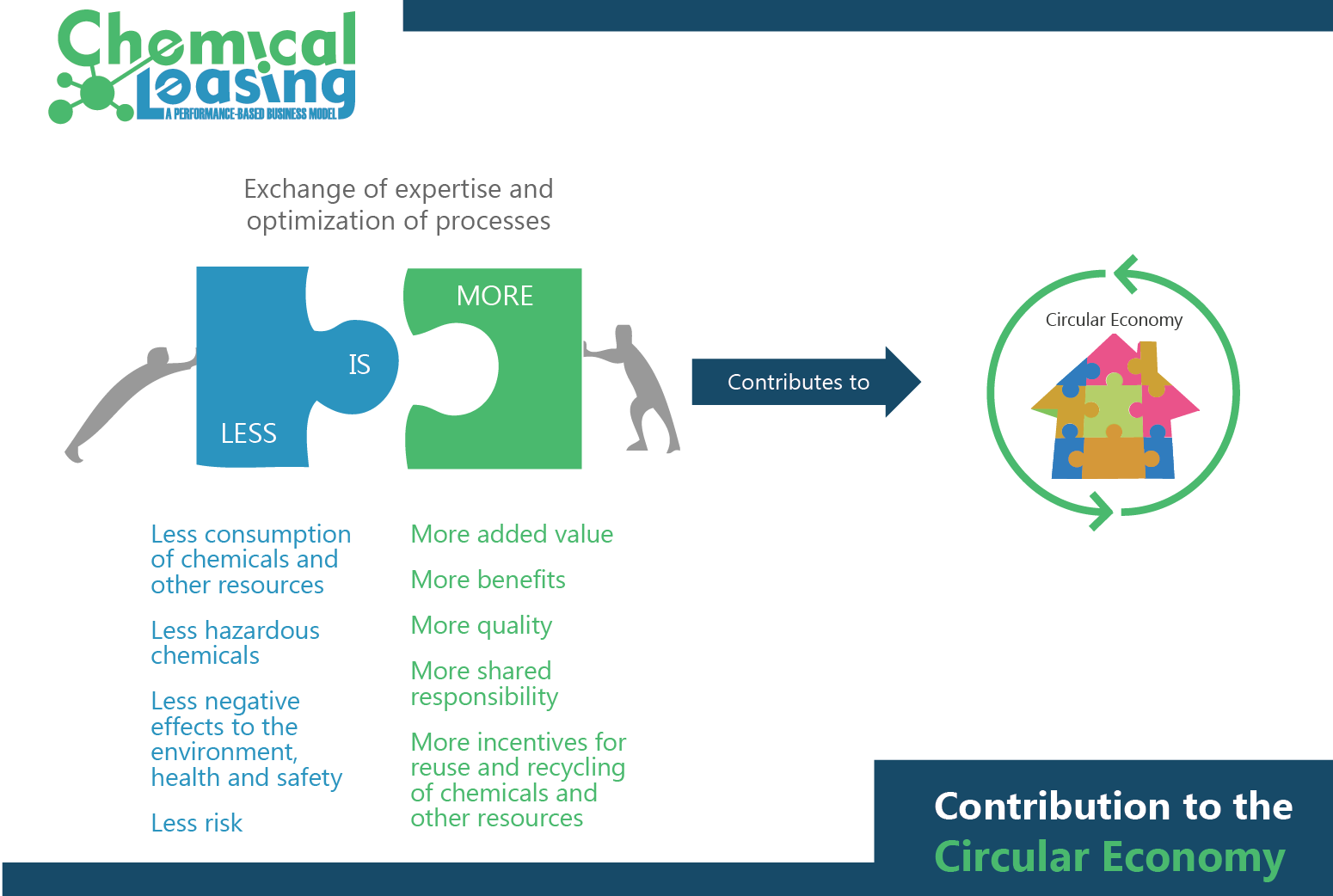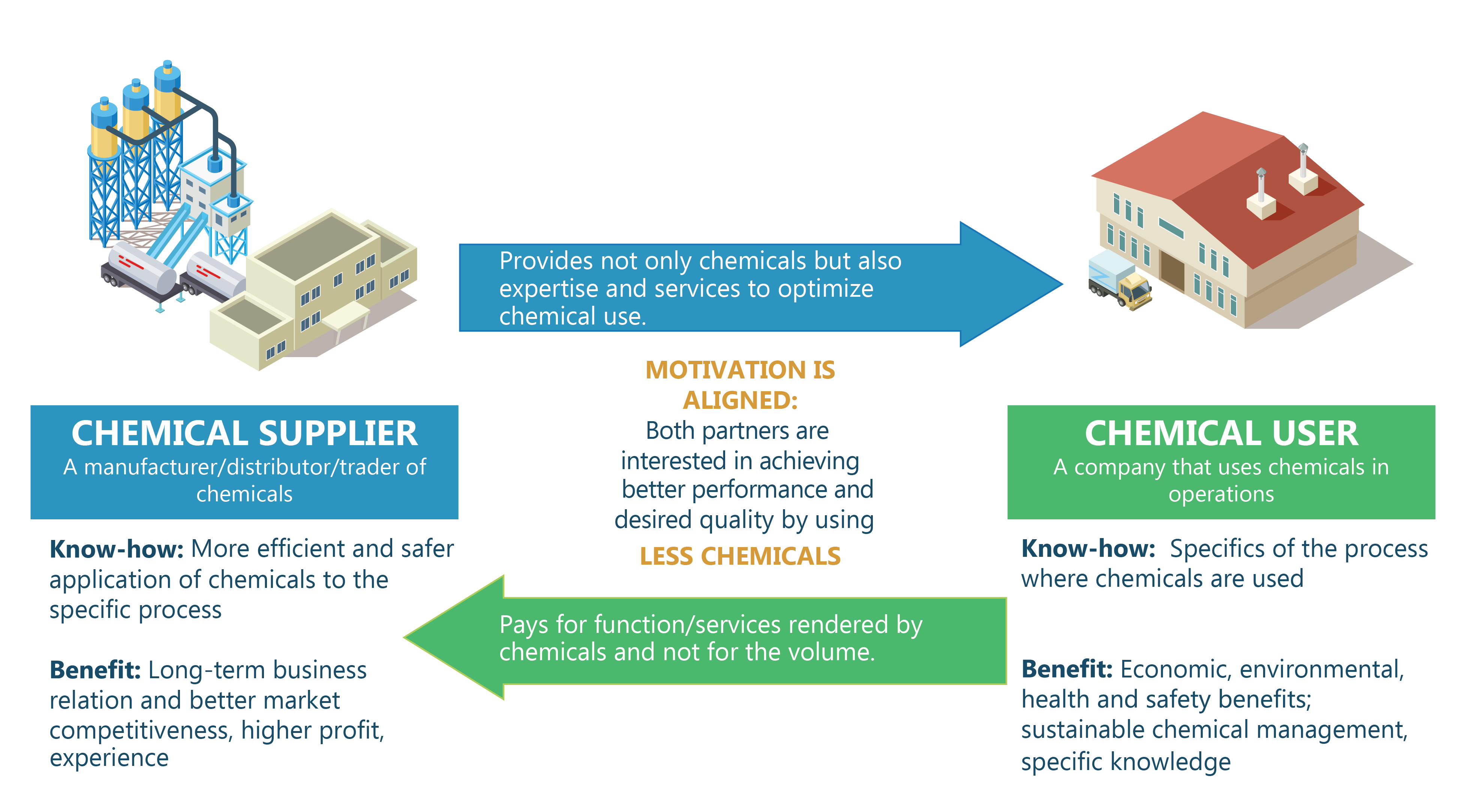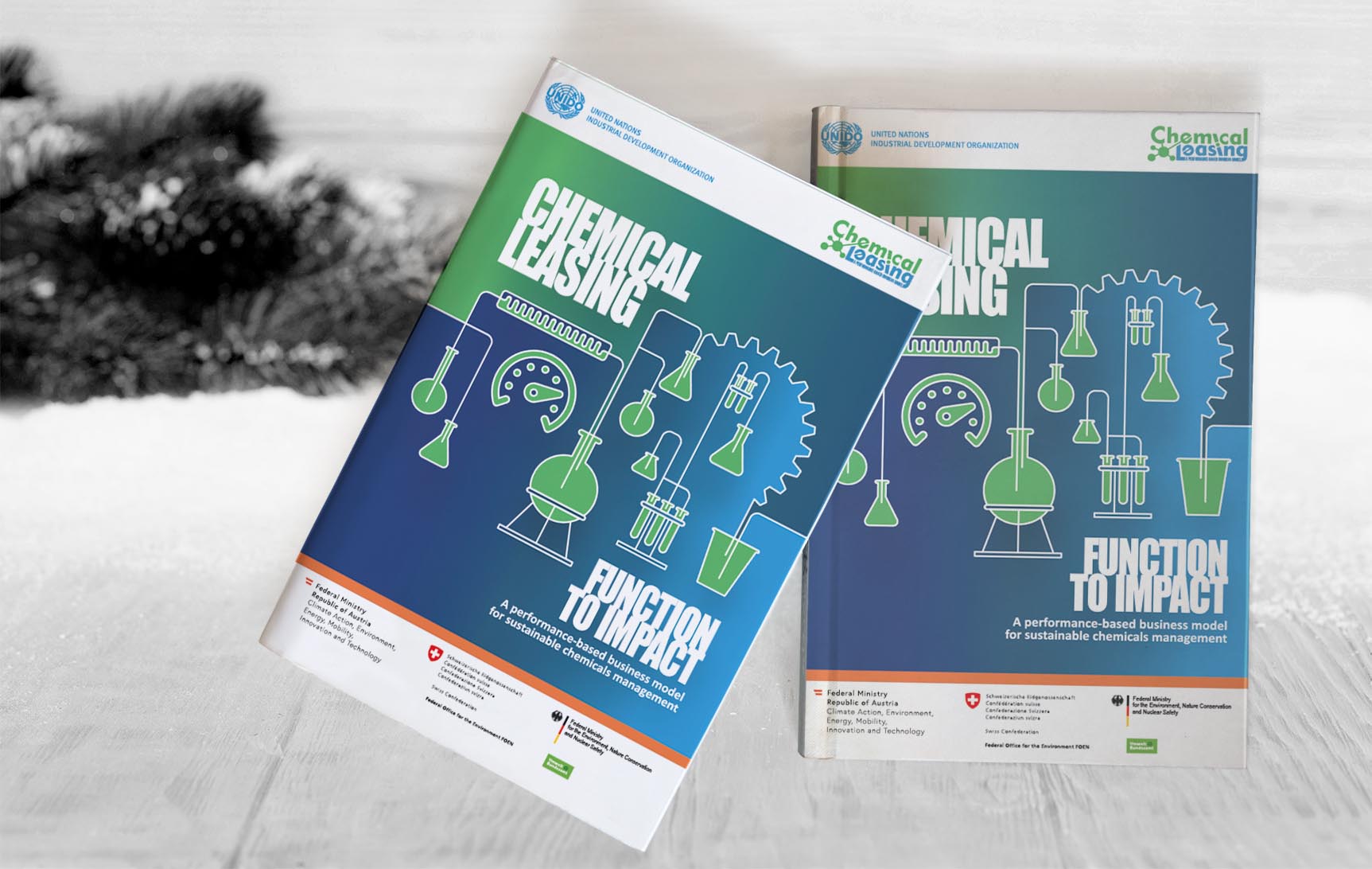About the model
Chemical Leasing is a performance-based business model for sustainable chemicals management. Chemical Leasing aims at a more efficient use of chemicals in the production process by redefining the business relationship between the chemical user and the supplier.
The conventional business model assumes that the more you sell, the more you earn. However, in Chemical Leasing the supplier does not sell quantities. The supplier sells the performance, the function of the chemical. This is the service rendered by the chemical or the purpose for which the chemical is applied.
For example, the function of the chemical could be to clean or degrease metal parts, or to protect a surface. Payment is then made according to functional units, that is, the number of pieces cleaned or the extent of area coated.
To learn more, please visit: www.chemicalleasing.org

UNIDO initiative
In 2004, with the support of the Government of Austria, UNIDO launched its Global Chemical Leasing Programme, promoting a performance-based business model that marks a paradigm shift from increasing the sales volume of chemicals toward a value-added approach.
UNIDO's Global Chemical Leasing Programme contributes to the UN Sustainable Development Agenda 2030 and addresses in particular SDG 9, “Build resilient infrastructure, promote inclusive and sustainable industrialization and foster innovation”. It also relates directly to the SDGs 3, 6, 12 and 13. The initiative is fully in line with SAICM principles and aims to contribute to the Circular Economy movement.
Today, more than fifteen years later, there is no doubt that the performance-based business model, Chemical Leasing, can build the business case for sustainable chemical management by creating win-win situations for business partners and the environment.
Built on strong cooperation between partners and based on mutual trust, it increases the efficient use of chemicals, reduces the risks to human health brought about by their use, improves the economic and environmental performance of participating companies and ultimately enhances business performance.

Joint Declaration of Intent
On 21 November 2016, the UNIDO-led global and multi-stakeholder initiative on Chemical Leasing achieved another milestone with the signing of the Joint Declaration of Intent on Chemical Leasing between UNIDO, Austria, Germany and Switzerland under the umbrella of UNIDO's 50 Years' anniversary week in Vienna, Austria. Later Peru, Serbia, El Salvador and Sri Lanka also joint the initiative. The legally non-binding declaration is open for additional partners and aims to increase awareness of Chemical Leasing at the political level and strengthens the cooperation of the partners in global promotion activities.

Global Chemical Leasing Award
In 2009 UNIDO, supported by its partners, launched the Global Chemical Leasing Award. It aims at acknowledging best practices and inspiring companies and individuals around the globe to apply the Chemical Leasing business concept. In December 2019, UNIDO announced the 5th edition of the award (Press release). The ceremony will take place in July 2021 in Bonn, Germany (the dates have been changed due to the coronavirus pandemic). Companies and individuals could apply for the Award in five categories: Three main categories (Case studies, Innovation, Research) and two special awards (Women-led initiatives, Start-ups). The application period was closed on 15 December 2020. Detailed information about each award category and requirements are provided here.
The Award 2020 is jointly organized by UNIDO, the Austrian Federal Ministry for Climate Action, Environment, Energy, Mobility, Innovation and Technology (BMK), the German Federal Ministry for the Environment, Nature Conservation and Nuclear Safety (BMU), the German Environment Agency (UBA), the Swiss Federal Office for the Environment (FOEN) and the European Association of Chemical Distributors (FECC).
The following organizations are committed to help disseminate information about, and promote Chemical Leasing and the global Award: The Green Growth Knowledge Partnership, ISC3 and ENACTUS (the world´s largest experiential learning platform).

Chemical Leasing Book:
In 2020, UNIDO, together with its partners from the Austrian, German and Swiss governments, published the book: “ChemicaL Leasing: Function to Impact”. This publication is a unique collection of insights, best practices and real examples of how the private sector, society at large, and the environment can benefit from the sustainable business approach, Chemical Leasing. It can be downloaded here:
https://chemicalleasing.org/book2020
Interested to learn more about Chemical Leasing? Explore the following resources:
Chemical Leasing website provides details on global Chemical Leasing activities, the Global Chemical Leasing Award, latest news and publications.
Chemical Leasing Toolkit offers a methodologic guidance to implement Chemical Leasing at the company/policy level.
FB page shares practical insights, reflections and experiences related to the Chemical Leasing business model and Sustainable Chemical Management
Chemical Leasing webinars aim to create a better understanding of Chemical Leasing principles and develop skills for introducing and applying Chemical Leasing in practice
Chemical Leasing video on Youtube
Contact us:
Questions about the Chemical Leasing business model and respective award may be addressed to ChemicalLeasing@unido.org.
Other useful links:
- www.IAMC-toolkit.org The Toolkit “Innovative Approaches for the Sound Management of Chemicals and Chemical Waste” (IAMC) developed by UNIDO, provides practical tools, techniques, and documentation (methodological guide & technical resources) on the topics related to Green Chemistry and chemical process improvement, Hazard Management, and Operational Excellence.
- https://www.iomctoolbox.org/ The IOMC Toolbox for Decision Making in Chemicals Management is a problem solving tool that enables countries to identify the most appropriate and efficient national actions to address specific national problems related to chemicals management.